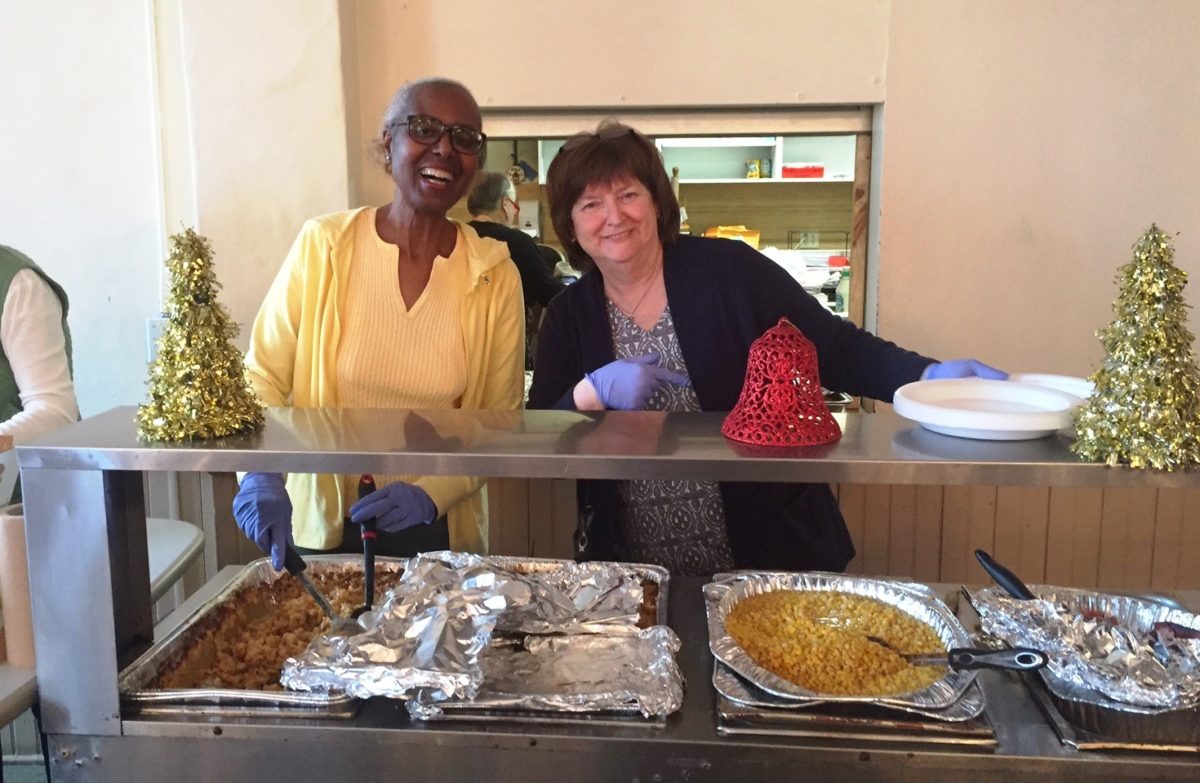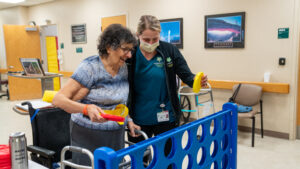At the holiday luncheon at St. Patrick’s Center, plates were piled high with ham, turkey and the trimmings, with a fresh green salad on the side.
Such abundance is a rarity for people who live — often on the streets — in Wilmington’s poorest neighborhood, the lowest-income ZIP code in the state of Delaware.
“I don’t always get to eat, so today I am eating a lot,” said Carolyn Lee, one of about 200 people who attended the event.
Five days a week, year-round, Christiana Care social workers embedded at St. Pat’s connect people who need help with housing, transportation, financial assistance and medical and behavioral health care. And each year during the holiday season, doctors, nurses, social workers and retirees from Christiana Care volunteer to cook, serve and clean up after the annual luncheon that provides a special opportunity for fellowship and good cheer.
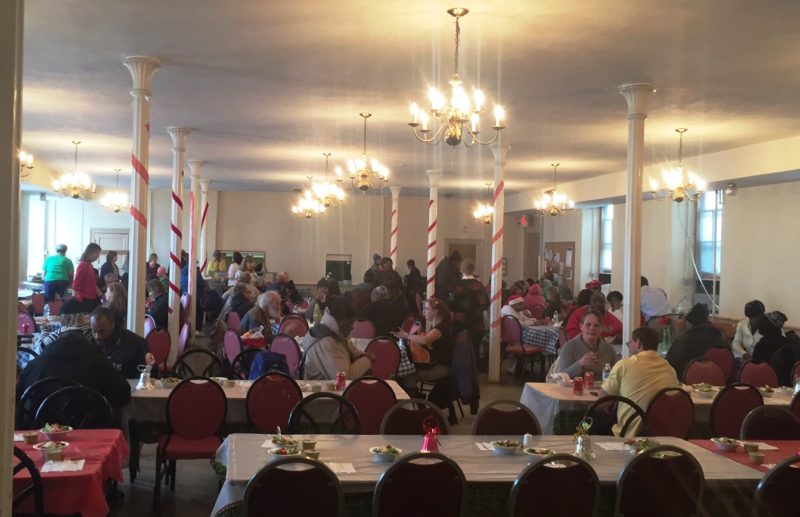
St. Pat’s is located on the impoverished east side of Wilmington, where there is so little access to fresh food it is classified as a “food desert” by the U.S. Department of Agriculture. The people who live there are at increased risk for obesity, cancer, cardiovascular disease, diabetes and hypertension, and premature death.
“The social workers from Christiana Care do more than social work,” said Joel Harris, executive director of St. Patrick’s Center. “It’s more like social triage. They love what they do, they care about people so much. They are awesome.”
People seeking assistance don’t need a referral to talk to a social worker. They simply come in from the street and into a welcoming, respectful and caring environment.
“It is hard to navigate the system when you are poor and have medical problems, especially when you don’t have support from a family,” said Carmela Longobardi, MSW, a Christiana Care medical social worker embedded at St. Pat’s.
Removing barriers to help makes it easier for people to get the resources they need to be healthy and safe.
Howard Collins was homeless for three years and developed heart and respiratory problems. His social worker helped him to get housing through the Veterans Administration. She also helped him to apply for Medicaid, which covers the costs of his medications.
“I am healthier and able to work part time,” Collins said. “I also volunteer at St. Pat’s because I want to give back and help other people.”
Harris said that 27 homeless people were connected with housing during the first three weeks of December.
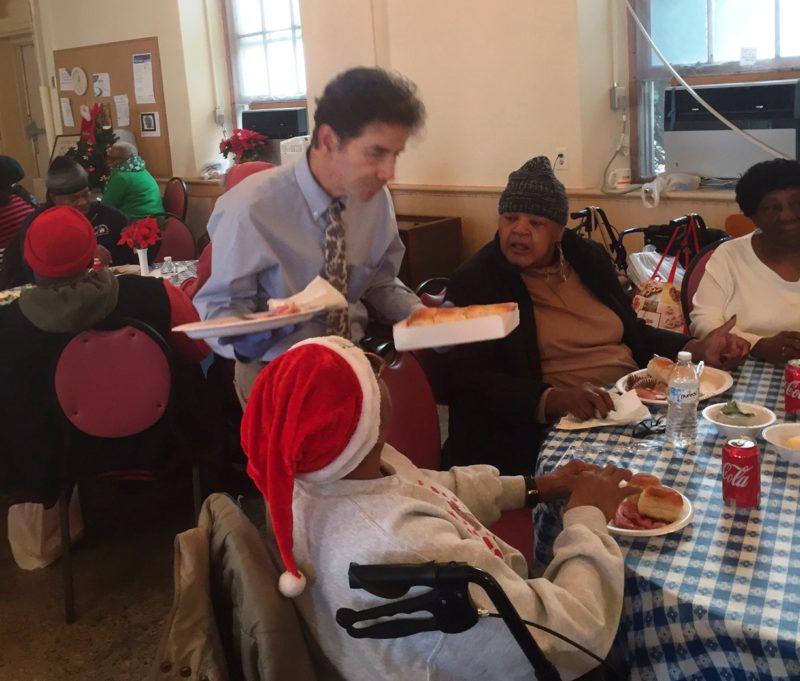
Matthew Burday, D.O., was volunteering for the second time at the annual holiday luncheon. As a physician, he believes it is important to provide compassion, as well as good medical care.
“If people have not been vaccinated and live in unsanitary conditions, it is easy for disease to spread,” Dr. Burday said. “This type of hands-on experience benefits the doctors of today and can inspire the doctors of tomorrow.”
James M. Ellison, M.D., MPH, The Swank Foundation Endowed Chair in Memory Care and Geriatrics at Christiana Care, said the holidays are a stressful time of year for many people, especially those who face hardships.
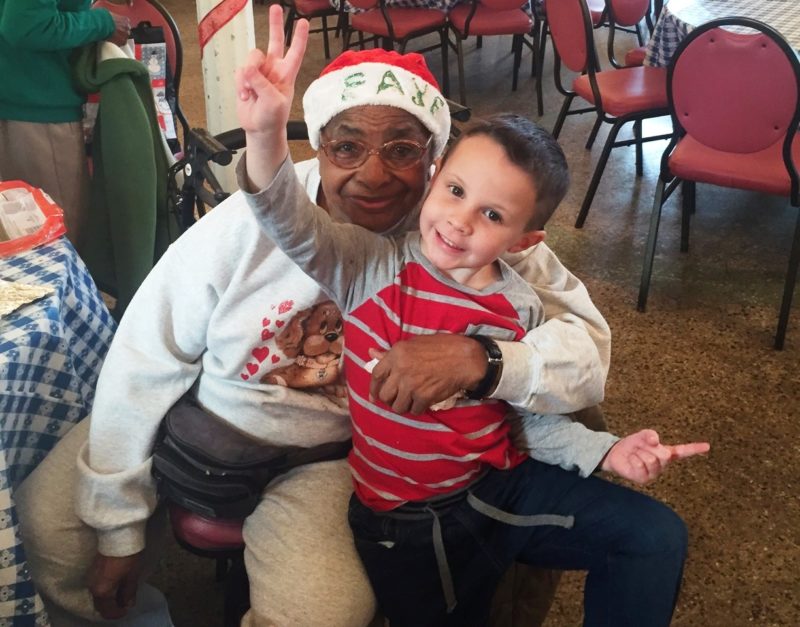
“I am proud to be part of an organization that shows such compassion and care for those in need by helping to support St. Pat’s, an extraordinary and valuable organization,” Dr. Ellison said.
The partnership at St. Pat’s has also helped to educate some of the city’s most vulnerable residents about how to make the best use of the resources available to them and take control of their health care needs. People at the center can get free blood-pressure screenings and flu shots. They can attend monthly lunch-and-learn sessions, where agencies come and present information on resources in the community.
Kenneth Marris came to the luncheon for the macaroni and cheese and the companionship. “It’s good to be around people,” he said.
Marris was recently hospitalized for pneumonia. He said he might have gone back to the Emergency Department for some aches and pains but has since learned to call his primary care provider, instead.
Connecting people with primary care providers will help them to stay healthy and out of the Emergency Department, Longobardi said.
“We have deconstructed the way people look at the Emergency Department,” she said. “When you go to the ED, you are only addressing the need that sent you there. If you have a primary care provider, you can get all your needs addressed.”
People at St. Patrick’s Center are building the foundation they need to transform their lives, one person at a time.
“It doesn’t work without partnerships,” Harris said. “Christiana Care helps us to meet people at their need and walk them through the steps they have to take to be successful.”
